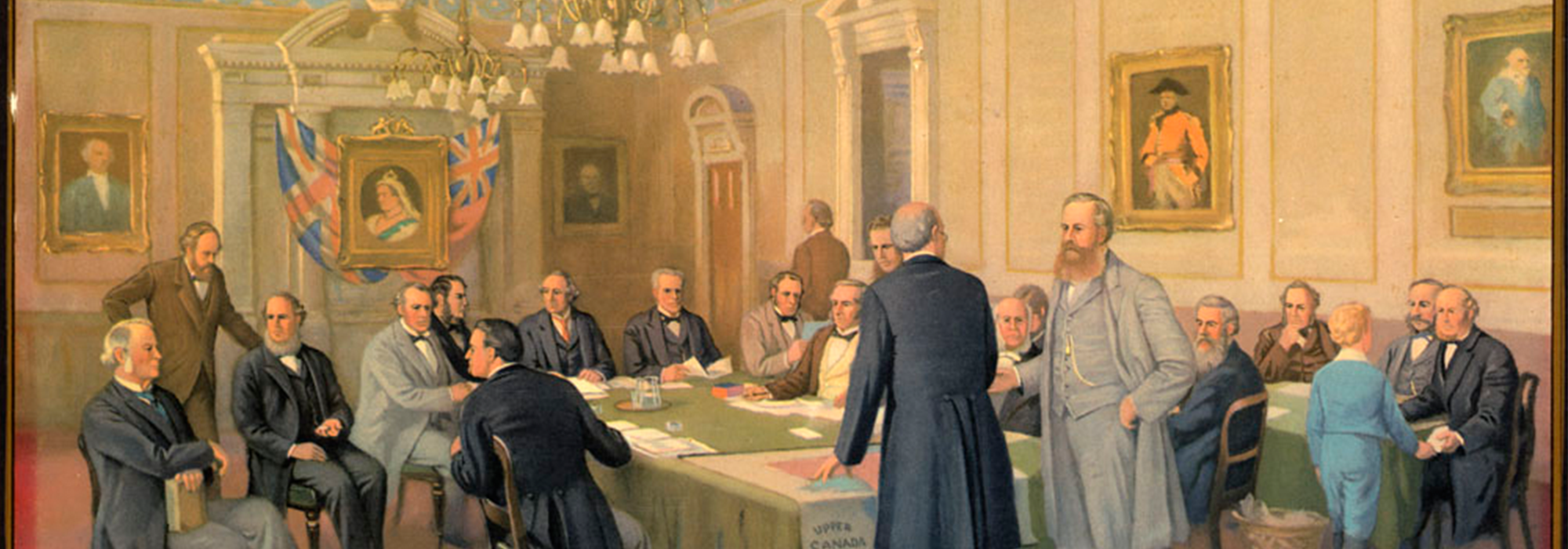
All three of my loyal readers may notice that I’ve been on a bit of an ‘originalism‘ binge lately (see post, post and post). Policy Options co-blogger Léonid Sirota and I have written a couple of papers on the subject of originalism (versus the “living-tree” interpretation of the Canadian Constitution), in which we hope to draw attention to this phenomenon and discredit the somewhat simplistic assumption, fostered in some quarters, that originalist analyses are somehow verboten in Canadian constitutional law. Despite their appalling length, our papers do not really get into whether the use of originalist reasoning in Canadian constitutional interpretation is a good or bad thing; our point is just that it’s a thing.
To that end, I direct your attention to the new decision out of New Brunswick, finding unconstitutional the prohibitions on inter-provincial liquor transportation. The judgment strikes me as thoroughly originalist, and since the decision has created some buzz, it gives me a welcome opportunity to beat this drum again.
Gérard Comeau was charged under a New Brunswick statute with the offence of transporting liquor or beer across provincial borders, following a surprisingly elaborate multi-force sting operation. By way of a defence to that charge, Comeau asserted that the law violated section 121 of the Constitution Act, 1867. Here is what that provision says:
121 All Articles of the Growth, Produce, or Manufacture of any one of the Provinces shall, from and after the Union,be admitted free into each of the other Provinces. (emphasis added)
This, argued Comeau, prevented the provincial legislature from enacting the law prohibiting the free admission of liquor between provinces, and under which he was charged.
The only problem was that there was a rather undisturbed line of binding precedent that had read the portion of section 121 underlined above to only prohibit interprovincial “custom duties” or other such taxes (see especially Gold Seal Ltd. v. Alberta (Attorney-General), (1921), 62 S.C.R. 424). According to these precedents, mere restrictions and prohibitions on interprovincial transportation of goods, as such, would not run afoul of section 121, unless those restrictions were imposed by customs or duties.
As the Court frankly noted in the Comeau decision, “(t)his interpretation has been applied in Canada by all provinces and territories for over 95 years”, based on the unbroken line of precedent just mentioned (at para 51). The defendant asked the Court to break it.
The Court starts out its analysis by singing from the Canadian constitutional hymnal, noting that the Constitution must be interpreted purposively, progressively, largely and liberally, and forever in a living tree fashion (at paras 41-48).
However, in actually interpreting the provision in question, the Court proceeds to refer extensively and almost exclusively to sources favoured less by so-called living constitutionalists, and more by originalist scholars and courts: namely, a close and careful reading of the constitutional text, as informed by a range of historical sources from at or around the time the law in question was enacted.
The Court finds that the Constitution does not include or imply the restrictions that had been read-into the provision in cases like Gold Seal. As the Court notes, the words ‘from customs and duties’ form no part of section 121, which was considered significant (at para 53). That is not, of course, the end of the analysis, otherwise we lawyers would be out of a job.
Continuing the analysis, the Court then employs a common originalist move, by juxtaposing the enacted language of section 121 with a previous (but unenacted) draft version of the same text. The draft version was more restrictive (“admitted free into all Ports in Canada”, instead of just “admitted free into each of the other Provinces”), leading to the rather natural inference that the broader language was intended by the drafters to be less restrictive (at paras 58-60).
Then, using another originalist tactic, the Court refers to statutes enacted and available prior to Confederation, and that roughly mirrored the language that had essentially been adopted by the Gold Seal court. The Court notes that those same terms were not used in section 121:
I find that significant. In drafting our Constitution, Mr. Reilly [a government lawyer] used wording similar to the legislative language used in New Brunswick, Nova Scotia and Canada to propagate interprovincial trade between the provinces. Most importantly, he did not include the words free “from duty”. [at para 63]
While I will not bore readers with a full summary of the judgment, suffice to say that the rest of the Court’s constitutional analysis focused almost exclusively on historical sources, including: various historical events leading up to Confederation; the purposes underlying Confederation, such as encouraging an economic union and the free passage of goods; the general temper of the times around Confederation (“(t)he 1860s were the high-water mark in the belief in free enterprise, in the idea that government should allow the private sector to operate with minimal regulation from government”); and even historical statements from the constitutional framers themselves, indicating the original intent behind the provisions (ie. expressing a “desire to bring about that same free trade in our own colonies” and observing that one of “the chief benefits expected to flow from the Confederation was the free interchange of the products of the labor of each province”).
In short, the constitutional analysis is thoroughly originalist, as far as I can tell.
For instance, there is little by way of a pragmatic or consequentialist reasoning – is there a compelling purpose to have inter-provincial liquor transportation prohibitions, or inter-provincial trade barriers generally? Nor is there any meaningful reliance on assumptions regarding the present needs or values of society. (This may be because, unlike certain contentious Charter provisions, the interpretation of obscure sections bearing on trade barriers is not an area liable to considerable moral evolution over the years. One presumes Canadians have liked booze, and have not liked being charged for travelling across borders with it, rather consistently over the years.)
Later in the judgment (I skip ahead here for the moment), the Court does address the Crown’s submission that the implications of the ruling would be vast, given the large number and many types of interprovincial trade barriers that had been erected since the time of Confederation. Although recognizing the weight of the submission, the Court found that these considerations could not trump the clear (and original) intention behind section 121. Relying on one of the Supreme Court’s most utterly originalist rulings, R. v. Blais, [2003] 2 SCR 236, the Court in Comeau found:
“The original purpose of the provision at issue” therefore, is an important consideration in approaching judicial interpretation of the Constitution. Courts should not allow such elemental and fundamental considerations to be displaced merely by notions of what, today, may amount to a request for accommodation based on a long-standing misinterpretation of the intent of the Fathers of Confederation. [para 165]
And so what about that pesky 95-year line of unbroken precedent to the contrary? The Court in Comeau reviewed this line of jurisprudence in some detail, and concluded (blasphemously) that the Supreme Court of Canada maybe did not do a particularly impressive job interpreting the provision.
Be that as it may, lower court judges are typically not permitted to disregard binding precedent because they happen to think it wrong or ill-advised; they are normally bound by it regardless, according to the principle sometimes called “vertical stare decisis” (“to stand by things decided” in order to confuse non-lawyers.
The Court acknowledged this constraint, and noted that departing from clear and binding precedent should only be done with caution and for compelling reasons (para 118). However, the Court here drew upon some recent decisions of the Supreme Court itself (most notably Bedford and Carter) in which the top Court effectively overruled its own precedents from a few decades prior. In those cases, the Supreme Court found that lower courts may also depart from binding precedent, where either (1) a new legal issue is raised, or (2) there is a change in the circumstances or evidence that “fundamentally shifts the parameters of the debate.”
The Court in Comeau found that while the first rationale did not apply, Gold Seal could be reconsidered on the basis of the second, “new evidence” exception. What was that new evidence? A bunch of historical information about the original purposes and meaning of the provision in question.
Of course, this is not exactly new evidence. It’s the opposite of new evidence. It’s very old evidence. But it was new to the court, as far as can be told from the previous judgments, and therefore, in this Court’s view, provided sufficient license to disregard cases like Gold Seal. This new-old evidence “allows this Court to proceed with its analysis and indeed mandates that it do so”(at para 125).
There is lots to mull over in this judgment. Leaving aside other substantive discussions on interesting issues of law, the case even included the “shocking allegation” that certain Supreme Court judges from the Gold Seal era had met with and been influenced by the then-minister of justice, prior to issuing their ruling in that case. This section of the judgment was particularly gripping and dramatic, albeit I am sure only in relative terms (sadly for me, one does not typically encounter scandalous accusations of high-political intrigue in constitutional law cases).
In any event, given its potentially vast implications (discussed by Marni Soupcoff here, and by the Court at paras 150-165), one suspects that more attention will paid to this decision – and the type of constitutional analysis underlying it – moving forward.
But in the meantime, if you’re in Canada and approve of the free flow of booze across provincial borders: thank an originalist, if you can find one.
Photo: Library and Archives Canada
Do you have something to say about the article you just read? Be part of the Policy Options discussion, and send in your own submission. Here is a link on how to do it. | Souhaitez-vous réagir à cet article ? Joignez-vous aux débats d’Options politiques et soumettez-nous votre texte en suivant ces directives.







